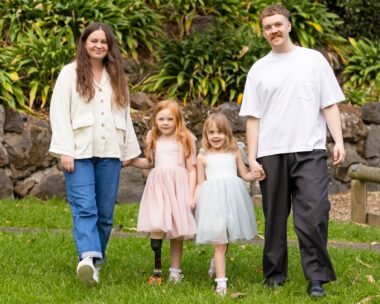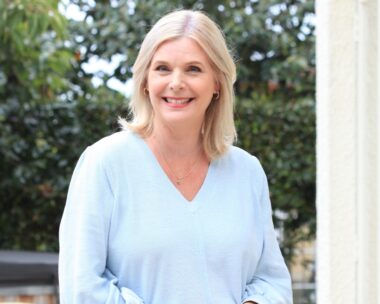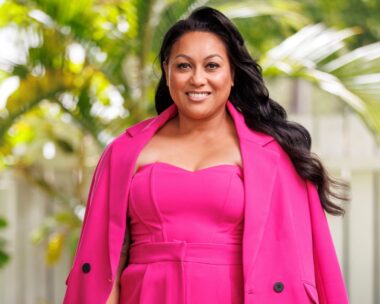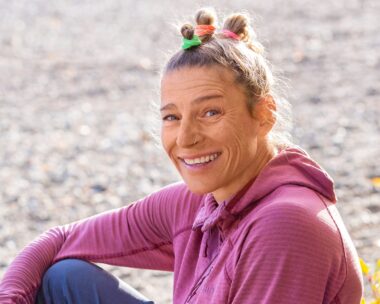When Saudi mum Manal al-Sharif dared to drive, she became an overnight Facebook sensation and was thrown in jail. Now living in Australia, Manal talks exclusively to the Australian Women’s Weekly about her brutal childhood, her battle for equality and why she must keep fighting.
It’s ironic and rather wonderful that today as I arrive to interview one of the most important and revered agitators in the world, it is Manal al-Sharif herself behind the wheel of her brand new shiny black Mazda who picks me up from Warnervale train station on NSW’s Central Coast. Fighting for the right to drive is Manal’s raison d’être and it has cost the 38-year-old mother-of-two dearly.
Manal lost her job, her house, her livelihood and fled her homeland, leaving behind the love of her life, son Aboudi, her parents and friends. But as we motor over Tuggerah Lake to her new favourite spot, the beaches around Norah Head, Manal grappling with the controls of her rather swish family car, it becomes clear there was nothing else this intelligent, vivacious, deep-thinking, proud Saudi Arabian woman could do.
In her own country, Manal is a pariah to the fiercely conservative status quo, who have called for her to be killed, beaten, locked up and even incited men to rape her; and an inspiring role model to others who hang on her every word and wish they could emulate her courage.
To the world outside the Kingdom of Saudi Arabia – the US, Europe, Scandinavia, and soon, no doubt, in Australia – she’s one of the 100 most influential people in the world (as named by Time magazine in 2012); a trailblazer, noble dissident, a champion for women’s rights and key player in a move for change at the very heart of Islam, in the daily life of women and girls trapped behind the veil.
It seems bizarre this determined troublemaker from the Islamic world should have ended up living in Australia with her Brazilian husband and youngest son, who is two years old. How she got here is an extraordinary tale of the power of the human spirit coupled with the sort of pragmatic expediency Manal has had to master in order to stay alive.

On Thursday May 19, 2011, Manal made a bold and dangerous stand that would change her life for ever. It might seem astonishing that such a simple thing, taken for granted as part of everyday life for most women – and men – around the world, could be considered so controversial and bring such extreme repercussions.
Manal, a divorcee working in the highly prized information security field for Saudi Arabia’s most prestigious company, climbed behind the wheel of her purple Cadillac SRX. Then, with fellow activist Wajeha by her side videoing the journey on her phone, she put her keys in the ignition, pulled her black hijab scarf tight around her face so no hair was showing, donned big black sunglasses and put her foot on the gas.
Manal drove along Corniche Street in her then hometown of Khobar and as she drove she chatted calmly for the video. She wasn’t berating, she wasn’t preaching, she wasn’t blaming, she was simply articulating the practical reasons why women should be allowed to drive in the Kingdom.
Banning women from driving was oppressive, damaging and made no logical sense. It put women at risk of harassment and attack from male drivers, the taxis women were forced to take were cripplingly expensive and in times of extreme urgency, such as a husband, parent or child needing to be taken for immediate medical care, human life was put in danger.
“That day, I felt I was driving for all Saudi women,” says Manal.
What was even more extraordinary about Manal’s actions, which caused uproar in her own land, was that she wasn’t actually breaking the law.

On Thursday May 19, 2011, Manal made a bold and dangerous stand that would change her life for ever. It might seem astonishing that such a simple thing, taken for granted as part of everyday life for most women – and men – around the world, could be considered so controversial and bring such extreme repercussions.
Manal, a divorcee working in the highly prized information security field for Saudi Arabia’s most prestigious company, climbed behind the wheel of her purple Cadillac SRX. Then, with fellow activist Wajeha by her side videoing the journey on her phone, she put her keys in the ignition, pulled her black hijab scarf tight around her face so no hair was showing, donned big black sunglasses and put her foot on the gas.
Manal drove along Corniche Street in her then hometown of Khobar and as she drove she chatted calmly for the video. She wasn’t berating, she wasn’t preaching, she wasn’t blaming, she was simply articulating the practical reasons why women should be allowed to drive in the Kingdom.
Banning women from driving was oppressive, damaging and made no logical sense. It put women at risk of harassment and attack from male drivers, the taxis women were forced to take were cripplingly expensive and in times of extreme urgency, such as a husband, parent or child needing to be taken for immediate medical care, human life was put in danger.
“That day, I felt I was driving for all Saudi women,” says Manal. What was even more extraordinary about Manal’s actions, which caused uproar in her own land, was that she wasn’t actually breaking the law.

Manal with elder sister Muna.
“There are no specific statutes or lines in the traffic code that forbid women from driving,” she explains. “I was disobeying the ‘orf’, the custom,” says Manal, who was delighted to have completed her drive without being stopped or arrested.
The stunt was to try to persuade female drivers to take to the streets a month later on June 17 in a Saudi-wide show of strength, part of the Women2Drive movement, which Manal was spearheading on Facebook and Twitter.
When the group posted the video on YouTube, it hit the number one spot in Saudi Arabia and jumped to one of the top videos in the world, with more than 700,000 viewings.
But condemnation came thick and fast and threats were made that women who dared to drive would be punished and shamed; so-called “man-wolves” would drag them from their cars, whip them with their iqals – the circle of rope used to keep a man’s headscarf in place – and potentially rape them.
Soon Manal realised her followers were losing their nerve. She needed to prove that these “man-wolves” didn’t really exist, and that even if female drivers were arrested they would simply have to sign a statement saying they wouldn’t do it again and be released.
And so, with her younger brother, Muhammad, by her side, Manal climbed into the driving seat once more, deliberately driving past the traffic police, and this time she was pulled over.
After many tedious hours at the police station, Manal was eventually released with a ticket for “driving while female”.
But then, at 2am, she was woken at home in the sort of middle-of-the-night arrest designed to terrorise.
“Aboudi was asleep and my brother was there with his wife and son, and when the secret police come to your house in the middle of the night, it’s not a good sign in Saudi Arabia,” Manal says.
She was forced to leave her son and was thrown into prison. The nine days she spent locked inside the filthy women’s jail retching on the stench of human excrement and urine, her cell crawling with thousands of cockroaches, and with scant access to legal counsel, were the most terrifying of her life.
“I thought I would disappear,” says Manal.
And when she finally came out – the result of her father pleading directly with the King – everything had changed.
Manal was born on April 25, 1979, in the holy city of Mecca. It’s the spiritual home of Islam and as such one of the strictest environments in the world for Muslim women, especially after the siege of the Grand Mosque in 1979, when religious fanatics seized the city.
“My generation was brainwashed,” says Manal.
At the very least, women – and girls who have started menstruating – were required to wear a black abaya (a full-length over-the-head cloak worn with a headscarf) when out, at best the niqab, with just a narrow opening for their eyes.
“By the early 1990s, the full-face niqab was imposed on all female students,” adds Manal. “It was the most stringent form. While the traditional niqab left a slit for the eyes, we were now supposed to lower our head scarves to block out this opening entirely. The full-face covering made me almost blind.”

Manal and brother Muhammad with their parents.
If a woman wore perfume she would be branded a seductress, and if attacked, it was her fault for beguiling the perpetrator.
“I was always questioning why God gave me a face, eyes, nose and a mouth and then he asked me to cover it,” Manal tells me, still incredulous at her country’s despotic attitude to the veil.
“Why do I have to be always feeling as if I’m an object of seduction? I have to be invisible, I have to walk next to the wall. I don’t talk to men or leave the house. Why did you create me, just to be for one man who is my husband? Why does he get to live a very normal life, while I can’t?”
Manal’s mother was alone and forced to give birth to her on the floor of their cramped apartment because her husband was out when she went into labour. Saudi rules do not allow women to be admitted to hospital without a male guardian or “mahram” in attendance; there are no exemptions.
While her children were raised to be devout, her mother was determined they would all – both her son and her two daughters – receive the education she and her husband were denied.
She also didn’t want Manal and her sister to marry before they had completed university, and actively turned down suitors on their behalf.
While appreciative of these concessions, Manal confesses she had “a terrible childhood”. She was regularly beaten by her father, who kept a cane hanging on the wall which he used on all of his children, saving his fists for his wife. She is still at a loss to explain the causes for the beatings, but domestic abuse was not an offence under Saudi law.
“I considered [father] Abouya’s bamboo cane the sixth person in our home. The cane was a familiar sight in almost any house in Mecca; very few of my friends were fortunate enough not to know its sting,” says Manal.
In addition, Manal’s mother would beat her kids with her bare hands, slapping and pinching their thighs and, when they ran away, throwing anything, even sharp scissors, to inflict pain.
“I have two scars on my forehead and a third under my left eye that will forever remind me of my mother’s furious beatings,” she says.
The scars are still visible and Manal says are a valuable reminder of her past.
“I made a promise to myself that my kids would not live the same childhood. They will always be encouraged, they will always be celebrated, they will always be loved and embraced,” she says.
The most horrific memory from Manal’s childhood came at age eight, when her father organised for two men – a local barber and his son – and a woman to come to their home and circumcise his daughters.
The intent was to prevent his girls from “deviant behaviour”. She talks about that terrible day for the first time in her just published groundbreaking memoir Daring to Drive. And she tells me it’s a day that still haunts her.
“I was just terrified.”

A traumatised Manal in the jalabiya she was wearing on the day of her circumcision. “I remember every detail,” she says.
In one swift motion the barber’s son grabbed me by my shoulders, the woman opened my legs and I began to cry and scream hysterically… The ‘operation’ was performed in a few snips with a single pair of scissors and no anaesthetic. The blood flowed red and wet down my legs… I bled for three days.
“Mum brought it up once,” Manal muses as she stares at a group of Aussie teenagers who have gathered with their surfboards by the beach we are sitting by. “She said that she was circumcised herself and hers was worse, they cut the labia. She remembers it vividly and was terrified.
“It’s so sad that the mother who endured this had to put her daughters through the same, because of the shame and society.”
The circumcision left Manal deformed, which she says made her feel “less than other girls”, and before her first wedding she voluntarily had cosmetic surgery.
“I told my ex-husband I am not going to marry without doing something to restore that area.” The procedure was “so painful” but her mum went with her and was “very supportive”, she adds.
Manal turned into a brilliant student, studying hard and eager to learn. But school life was strict and riven with religious dogma, which ultimately radicalised her. At 13, she transformed “from a moderately observant Muslim into a radical Islamist”.
In an attempt to save her brother from hellfire, she burned his pop music cassettes and filled her own leisure time preparing herself for death, vowing to change “the evil” around her.
“I think my childhood came in a time when there were religious fanatics going around Saudi Arabia,” she tells me. “My girlfriends’ daughters now, they don’t cover their faces and there’s no beating in the schools. So at least now I feel this generation will not go through the things we went through when we were kids.”

Manal started to think for herself when she went to university in Jeddah to study computer science. Life in this city was much more liberal than in Mecca and the internet opened up her world.
“That changed everything,” says Manal.
“The first thing I started reading about was the veiling. I met girlfriends in college who didn’t veil and that really traumatised me. But instead of preaching at them, I started reading and my God, I discovered all these other opinions. Some even said that the hijab [the headscarf] is not required!”
That was it, Manal was becoming a free spirit. When, after a long battle, she scored a job at Aramco, the world’s largest oil company, as the only Saudi woman in the information technology security department, her journey began. Entering the enclosed Aramco compound, a mini-city with offices, housing, parks, shops and amenities, Manal got a glimpse of Western life, and she liked it.
But Manal still faced endless barriers. Finding accommodation was pure farce, as she was banned from living on the compound as a single Saudi woman and also from hiring a hotel room.
Here she met her first husband, and their son, Aboudi, was born. She says the marriage was abusive and ended in divorce. Manal, tired of the regular beatings she received, managed to retain custody of her son and continued to enjoy work.
Then, on a work exchange trip to New Hampshire in the US, Manal finally – at the age of 30 – learned to drive and realised what freedom was all about. Returning to Saudi Arabia, she was determined to change the lives of her fellow women and so joined the Women2Drive campaign.
Following her time in jail, Manal returned to work, but her employers were not happy. The Women2Drive day went ahead, but Manal couldn’t take part and eventually had to resign from the job she loved so much.
“I gave away the job because I was pressured to stay quiet. I’d accepted the Vaclav Havel Prize for Creative Dissent [alongside Myanmar’s Aung San Suu Kyi and Chinese artist Ai Weiwei] and wanted to fly to Oslo to receive it. They wouldn’t allow me to give the speech – and it really opened the doors for me, that speech. So I said, ‘I quit.’ I quit and I flew.”
Her 17-minute speech in English went viral on YouTube and Manal was lauded around the world. But when she returned to Saudi Arabia, she faced no job, no home and daily death threats.
“I knew I had no choice but to leave,” she sighs.
Manal had started a “nodding acquaintance” with a fellow Aramco worker, a Brazilian called Rafael, and on one of their walks he declared his love. Rafael’s contract was finishing and he asked Manal to go with him to Dubai.
“I could not go there without being his wife,” says Manal. But neither the Saudi nor the Emirati authorities would allow the couple to marry, so eventually Rafael took Manal to Brazil to meet his family. He quietly converted to Islam, and they were married and moved to Dubai.
But Manal’s ex-husband would not allow Aboudi to live with his mother in Dubai. Even though Manal had legal custody, it was still her former husband’s right to prevent his son from leaving the country.

“I’ve always wanted to tell my story. It’s funny that it took driving a car for people to be interested,” says Manal.
“I took my ex-husband to court for two years and I lost. And now Aboudi doesn’t even live with his dad. He lives with his grandma, my ex-husband’s mother,” says Manal, sad and exasperated. “This is very difficult for both of us. So many times I cry,” she tells me with tears in her eyes.
When she was in Dubai, Manal flew regularly to see Aboudi and then she became pregnant, and a few months ago Manal, Rafael and their son Daniel, now two years old, arrived to make a new life in Australia. But their life is in limbo. Rafael has work through his international employers and Manal is consumed with human rights work, but they cannot unite their family. Their marriage is not accepted in Saudi Arabia, so while Manal can return, it would be without Rafael and Daniel. And Aboudi is in turn kept in Saudi Arabia by his father who doesn’t even live with him.
I ask her how she explains her life as an activist to Aboudi.
“It’s difficult. Right now we just miss each other. Because everything in Saudi is blocked, we talk to each other on ‘Talkee’ [a free chatline service]. You create a chat room, and our room is always called ‘Miss You’. I think Aboudi is the first love in my life. I’ve never loved anything, anyone, like Aboudi. He keeps me going.
“I have regrets, of course. I will always wonder what if I stayed in Aramco and was anonymous. When Mum passed away, I couldn’t take Daniel to see her [before she died]. That was very painful.”
Manal’s relationship with her faith is equally complex.
“Today I would call myself a liberal Muslim. Aboudi is raised Muslim, but Daniel I would like to choose. Aboudi has no choice because he’s in Saudi Arabia.”
And would she like to eventually bring him to Australia?
“No, I’d like to live in Saudi Arabia. It’s my homeland. I don’t like it when people say horrible things about Saudi Arabia.
“Not all Saudis are like this, there are good Saudis too, very educated, generous and genuine people. But most of my girlfriends, when they have the chance, they leave because they say, ‘I don’t have the energy to go through this hassle every day of my life.’
“I think I do because that’s how you create change. My ideal would be to go back to Saudi with my husband and son and create change rather than being away and hoping that change can happen.”



